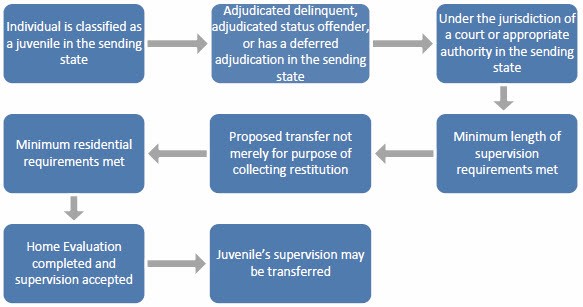Initial Considerations for Transfer of Supervision
3.4.1 General Eligibility Considerations
Because coverage is controlled by reference to the definition of juvenile in the ICJ and its rules, eligibility is a broadly defined concept. Thus, any “juvenile” covered by the ICJ is eligible to transfer supervision regardless of the underlying offense. As a preliminary matter, a person must be considered a “juvenile” in the sending state in order to be eligible for a transfer of supervision pursuant to the ICJ. ICJ Rule 4-101(2)(a) (Interstate Comm’n for Juveniles 2024). As discussed in Section 3.4.5, infra, receiving states are obligated to provide supervision and services to “juveniles” transferred pursuant to the ICJ who would not be considered “juveniles” under the laws of the receiving state.
The ICJ and its rules weigh greatly in the direction of facilitating the transfer of supervision for all juveniles, so long as the juvenile is subject to some form of supervision that is provided by the supervising state for its own juveniles. As one court has noted, the ICJ is to be liberally construed to effectuate the outcome for which it is designed. E.P. v. District Court of Garfield Cty., 696 P.2d 254, 263-64 n.12 (Colo. 1985). The determination of who qualifies as a juvenile is controlled by the law of the sending state as further discussed in Section 3.4.5, infra.
ICJ Rule 4-101(2) defines specific criteria that juveniles must meet to be eligible for a transfer of supervision through the Compact. Specifically, for a juvenile to be eligible for transfer of supervision under the ICJ, the juvenile must fulfill all of the following conditions:
- is classified as a juvenile in the sending state; and
- is an adjudicated delinquent, adjudicated status offender, or has a deferred adjudication in the sending state; and
- is under the jurisdiction of a court or appropriate authority in the sending state; and
- has a plan inclusive of residing in another state for a period exceeding ninety (90) consecutive days in any twelve (12) month period; and
- has more than ninety (90) days or an indefinite period of supervision remaining at the time the sending state submits the transfer request; and
- will reside with a legal guardian, relative, non-relative or independently, excluding residential facilities; or is a full-time student at an accredited secondary school, accredited university, college, or licensed specialized training program and can provide proof of acceptance and enrollment.
Juveniles who have been accepted as full-time students as described in ICJ Rule 4-101(2)(f)(ii) shall be considered for supervision by the receiving state. Id. Such juveniles are eligible for transfer of supervision, subject to the acceptability of the transfer of supervision plan. Nothing in the rules mandates that students enjoy special consideration regarding the suitability of the residence.
Many ICJ cases involve juveniles who are adjudicated in states other than their state of residence. The state where the case originated is considered the “sending state” and the case where the juvenile is supervised is the "receiving state," regardless of where the juvenile resided at the time of offense and/or adjudication. Moreover, such cases are often considered “mandatory acceptance” cases pursuant to ICJ Rule 4-104(5), because the juvenile’s legal guardian resides in receiving state and there is no legal guardian in the sending state. For further discussion of the “mandatory acceptance” rule, see infra Section 3.4.4.
In addition, ICJ Rule 4-102 requires the "sending state" to provide an ICJ Form VII, Out-of-State Travel Permit and Agreement to Return, when it is necessary for a juvenile “. . .to relocate prior to the acceptance of supervision, under the provisions of Rule 4-104(5). . .”

